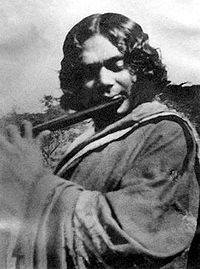Kazi Nazrul Islam Writer
Kazi Nazrul Islam (Bengali: কাজী নজরুল ইসলাম pronounced: [kadʒi nodʒrul islam]) (24 May 1899 – 29 August 1976) is the national poet of Bangladesh. He was also a Bengali polymath, poet, writer, musician and revolutionary. Popularly known as Nazrul, his poetry and music espoused Indo-Islamic renaissance and intense spiritual rebellion against fascism and oppression. Nazrul's impassioned activism for political and social justice earned him the title of The Rebel Poet (Bengali: বিদ্রোহী কবি; Bidrohi Kobi). His compositions form the avant-garde genre of Nazrul Sangeet (Music of Nazrul). Accomplishing a large body of acclaimed works through his life, he is officially recognised as the National Poet of Bangladesh and is highly commemorated and revered in India, especially in West Bengal.Born into a Bengali Muslim Quazi (Kazi) family, Nazrul received religious education and worked as a muezzin at a local mosque. He learned of poetry, drama, and literature while working with theatrical groups. After serving in the British Indian Army, Nazrul established himself as a journalist in Calcutta. He assailed the British Raj in India and preached revolution through his poetic works, such as Bidrohi (The Rebel) and Bhangar Gaan (The Song of Destruction), as well as his publication Dhumketu (The Comet). His nationalist activism in the Indian independence movement often led to his imprisonment by British authorities. While in prison, Nazrul wrote the Rajbandir Jabanbandi (Deposition of a Political Prisoner). Exploring the life and conditions of the downtrodden masses of the Indian subcontinent, Nazrul worked for their emancipation. He fiercely inspired Bengalis during the Bangladesh Liberation War.Nazrul's writings explore themes such as love, freedom, and revolution; he opposed all bigotry, including religious and gender. Throughout his career, Nazrul wrote short stories, novels, and essays but is best known for his poems, in which he pioneered new forms such as Bengali ghazals. Nazrul wrote and composed music for his nearly 4,000 songs (including gramophone records), collectively known as Nazrul geeti (Songs of Nazrul), which are widely popular today. In 1942 at the age of 43 he began suffering from an unknown disease, losing his voice and memory. It is often said, the reason was slow poisoning by British Government but later a medical team in Vienna diagnosed the disease as Morbus Pick, a rare incurable neurodegenerative disease. It caused Nazrul's health to decline steadily and forced him to live in isolation for many years. Invited by the Government of Bangladesh, Nazrul and his family moved to Dhaka in 1972. Later, he was accorded Bangladeshi citizenship. He died four years later on 29 August 1976.
Search
Writer
| award | |
|---|---|
| influenced | |
| influenced by | |
| language | |
| notable work |
Kazi Nazrul Islam on Wikipedia
External resources
- http://banglapedia.search.com.bd/HT/I_0109.htm
- http://nazrul.org/nazrul_audio/recite.htm
- http://plabon.com/category/bangla-books/kazi-nazrul-islam
- http://www.allbdbooks.com/index/w/70
- http://www.ebooksdunia.com/2011/07/kazi-nazrul-islam-pdf-ebook-free.html
- http://www.kazinazrulislam.org
- http://www.nazrul.org
- https://www.facebook.com/shompurnonazrul
- https://www.youtube.com/watch?v=NxLGwK0CZFc&list=PLEEem6Ah7X_KGRzSKENHd3NNke6x4t-Lf
